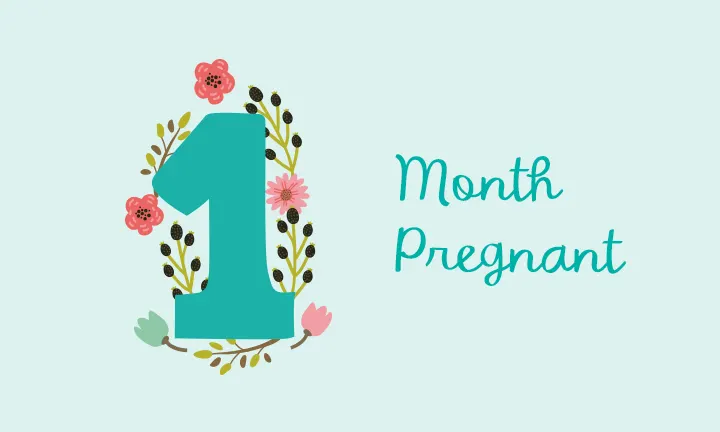1 Month Pregnant: Pregnancy Month by Month
You might have noticed some unusual changes and started to wonder: Could I be… pregnant!?
Or you might not observe any early signs of pregnancy except that your period is late. Either way, you can take a home pregnancy test that will confirm your pregnancy, and then visit your healthcare provider for a medical checkup and to schedule the rest of your prenatal appointments.
Common Pregnancy Symptoms at One Month Pregnant
Early signs of pregnancy at one month pregnant aren’t necessarily the most noticeable; however, they can include:
Mood changes
Bloating
Cramps
Lower backache
Spotting
Frequent urination
Sore or tender breasts
Fatigue
Nausea
Constipation
Food cravings and aversions
Missed period
Keep in mind that at one month pregnant, you may not experience most or any of these changes or conditions. Instead, you might first suspect you could be pregnant when you notice your period is late, and then that you’ve missed your period altogether.
One Month Pregnant: Changes Inside and Out
Embryonic Development: After conception, the fertilized egg will travel from the fallopian tube to the womb and will implant in the uterus lining. The egg divides into a bunch of cells, becoming an embryo. At about week eight, the embryo has developed a tiny spine and limbs, and has started to grow the brain, eyes, and ears.
Changes to Your Body: When you find out you're pregnant, you might react in different ways than you expected. Your feelings might even change from one moment to the next. These emotional shifts, caused in part by pregnancy hormones, are totally normal. Allow yourself the time to rest and process your feelings. Aside from the early pregnancy symptoms described above, you might not notice too many other physical changes.
What Are the Pregnancy Months?
Pregnancies last nine months, right? Well, kind of. Pregnancies are typically about 40 weeks (almost 10 months) long, starting from the first day of your last menstrual period. But it's not unusual for babies to arrive a few weeks early or late, and the "months" are a bit longer than four weeks. Also, sometimes it's hard to pinpoint the exact date of conception. So, with all these variables, “nine months” is just a rough guide.
That's why pregnancies are usually measured in weeks rather than months, and why you'll hear references to “week 12” or “week 32,” for example. You'll also notice references to the “pregnancy trimesters.” The three pregnancy trimesters are:
First trimester: weeks 1-13
Second trimester: weeks 14-27
Third trimester: weeks 28-42
So, how do you determine how many months pregnant you are? There are different ways of calculating this, but often you are considered one month pregnant in about weeks five to eight of pregnancy — these are the weeks that follow your first missed period. Remember, though, you will have conceived some weeks before what's referred to as this first month.
Due date calculator: At one month pregnant, you'll be eager to know when to expect your newborn, and the Pampers Due Date Calculator is a handy tool to give you an estimate. If you have irregular periods or you can't remember the date of the first day of your last menstrual period, your healthcare provider can make an assessment of how far along you are in your pregnancy.
First Month of Pregnancy Quick List
Find out if you’re pregnant: You can find out you’re pregnant by taking a home pregnancy test. These tests are usually more accurate when taken a few days or even a week after the first day of your missed period.
Get a doctor’s checkup: Head to your healthcare provider, who’ll be able to confirm your pregnancy via tests, including measuring your levels of the hormone known as human chorionic gonadotropin (hCG). Your provider will also be able to give you guidance on the appointments you’ll need to keep over the next nine months (or so).
Pregnancy nutrition: Speak to your doctor about healthy pregnancy nutrition and what pregnancy vitamins or supplements might be right for you.
Refocus on your health: Try to quit unhealthy habits like smoking and drinking, and try to reduce stress.
Check in with your feelings: This is an emotional time, and you might be feeling all kinds of physical symptoms and pregnancy emotions. Rest up, and speak to loved ones about how you are feeling.
Sign up for even more pregnancy tips.
